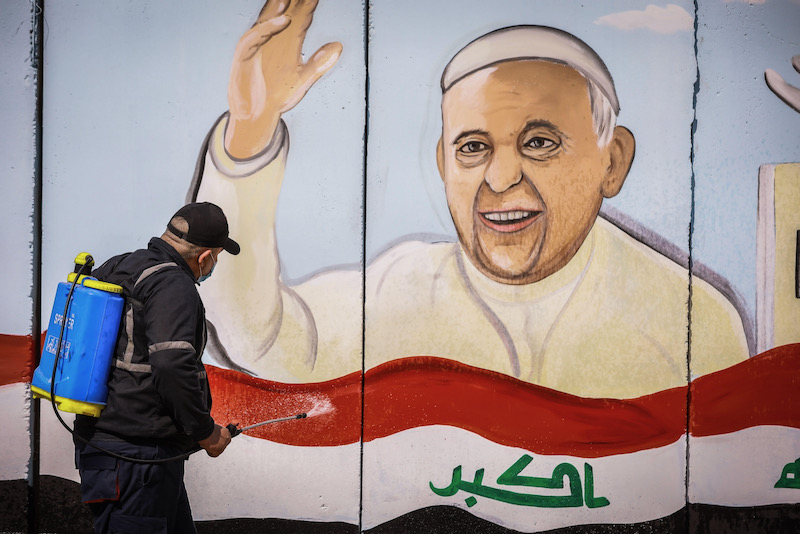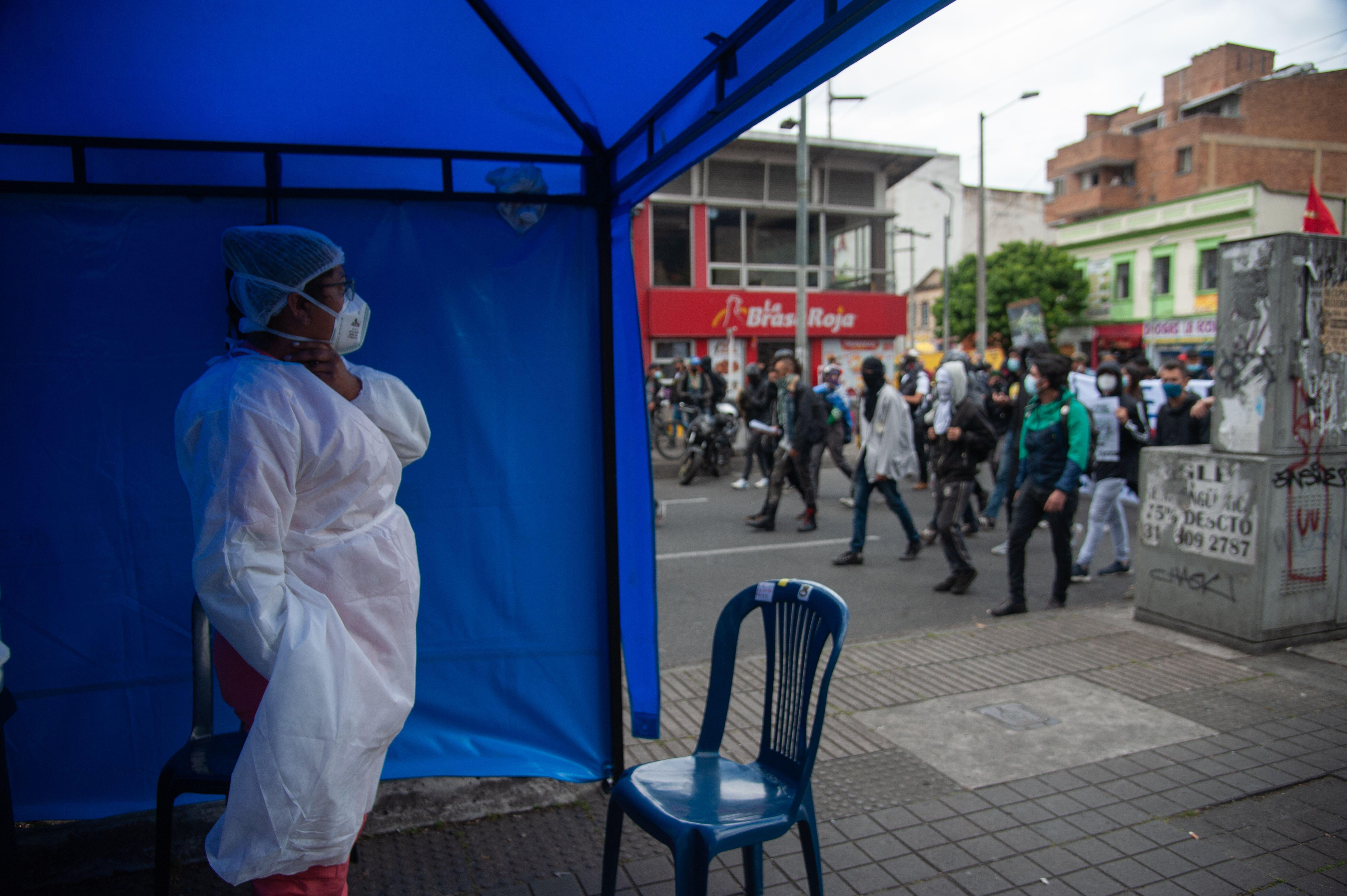The sun was beating down as we arrived at the border between Venezuela and Colombia, travelling from Cúcuta that morning. There was already a long queue of people outside the Divine Providence Soup Kitchen – men, women and children who had been there from 7.00am.
The vast majority Venezuelans who had come across the border that day in search of food. Many would return home and repeat this trip every day, while others would carry on into Colombia and further afield in search of a better life.
An army of mainly Church volunteers handed out coffee and bread, and vouchers for lunch, which would be served from midday. They were trying to find out people’s needs and looking out for those who were most at risk. This was in September 2017, the height of the exodus out of Venezuela due a multitude of factors including a collapsed economy, increased food shortages and political persecution.
The soup kitchen is an impressive collaboration of the extensive network of Catholic groups in the area and sprung up quickly to respond to the needs of the increasing numbers of Venezuelans crossing the border. The food comes from local donations, either via the different church groups who are helping, the Caritas food bank or local businesses and individuals. The Church was the first institution to respond to the crisis in Cúcuta, well before any other support was available.
The soup kitchen had started three months earlier and, on the day I visited they were serving 2,000 meals. Sister Gloria Lucia Lozano, from the Sisters of Charity of St Vincent de Paul, helps once a week and told me: “Here we put into practice the multiplication of loaves and fish.”
I met Iuri sitting at one of the long tables eating her lunch with her 7month old son, Steven. She had been coming for a month: “I come because I need the food …. We couldn’t afford a plate of food like this back home because everything is so expensive, and we don’t have that sort of money.”
Families back in Venezuela simply could not afford the sky-rocketing prices of basic foods. Based on the networks and trusted relationships between churches in Colombia and Venezuela, the Caritas Food Bank was also able to give food rations to Venezuelan priests crossing the border back into Venezuela so they can distribute it to those who cannot leave.
I saw a microcosm of the bigger picture, both in Colombia and throughout the region. According to the UNHCR[1], there are around 5.4 million refugees and migrants worldwide from Venezuela, most leaving in the past few years in the largest exodus in recent Latin American history. Children, women and men have fled violence, insecurity, scarcity and increasing poverty. Caritas Internationalis, the global development arm of the Catholic Church, has already enabled local Caritas agencies to reach more than one million Venezuelans in Ecuador, Colombia, Venezuela, Brazil and Peru.
The reach of the Catholic Church and its ability to respond first in many crises, as well as its trusted role in society, enable the Church to meet people’s needs and transform communities, according to a new report by CAFOD, the Distinctive role of the Catholic Church in development and humanitarian response. The report argues that governments should involve the Church earlier in any development work, and should further support its work on humanitarian response, peacebuilding and mediation.
These networks in Colombia have been built on decades of accompaniment by the Catholic Church to communities who have suffered human rights abuses, displacement and poverty due to the internal armed conflict that ravaged the country for over 60 years. Caritas Colombia (SNPS) and the action teams in local dioceses have a long history of accompanying different communities through a permanent presence of priests, nuns, lay staff and volunteers. Their vocation to serve and be with the people has meant that they have stayed living in communities experiencing violence when many other organisations and institutions have left:
“In the 20 years I have been a priest in Colombia, I have lived with armed conflict. I have had to deal with all the armed groups… and feared for my life many times... I was singled out and threatened many times as I stood alongside people forced to flee their homes, remained with those who stayed and endured, and picked up dead bodies, even when armed groups forbade us.” (Fr Sterlin, priest in Diocese of Quibdó)[2]
During much of the internal conflict, the Church was the only trusted institution and people would report human rights abuses by the state and armed forces to local priests and church workers. The Church therefore bore witness to the suffering of the most vulnerable sectors of the population and accompanied them in their suffering. They also played an instrumental role in bringing victims to the peace talks in Havana, which led to the inclusion of a chapter on the rights of victims to justice, truth and reparation.
The Church has been vocal in speaking out against human rights abuses and was one of first organisations to raise awareness of displacement crisis and the systematic human rights violations. The Jesuit research and education organisation, CINEP, has a database recording human rights violations, including those killed during the political violence. This information has been shared with the Truth Commission, which is due to publish its findings later this year to bring to light what happened in the more remote regions of the country, often where the State, guerrilla forces and other illegal actors were committing abuses and refused to acknowledge them. It has been used as evidence to seek reparations and justice for perpetrators of crimes.
Caritas Colombia, alongside other civil society groups and victims’ organisations, succeeded in getting a “Victims Law” passed, which aims to return stolen and abandoned land to internally displaced Colombians and provide reparations – including financial compensation – to victims of human rights violations.
In recognition of the role of the Catholic Church in promoting peace in Colombia, Mgr Hector Fabio Henao, director of Caritas Colombia is a member of the National Peace Council that is responsible for promoting peace and reconciliation, also having served as its president.
Overlaying these multiple and complex challenges in Colombian society, people had to respond to the new challenges posed by Coronavirus. The Catholic Church in Colombia has used its trusted role in communities and its extensive networks to provide medical care, food parcels and emergency hygiene kits to those most at risk due to the Coronavirus Pandemic. With more than 50,000 deaths, Colombia has been one of the countries hit hardest and the Church will be central to ensuring that all people are reached with a vaccine and with ongoing support that they need.
Graham Gordon is Head of Policy at CAFOD, and author of the report: 'The Distinctive role of the Catholic Church in humanitarian and development response'



 Loading ...
Loading ...
What do you think?
You can post as a subscriber user ...
User comments (0)